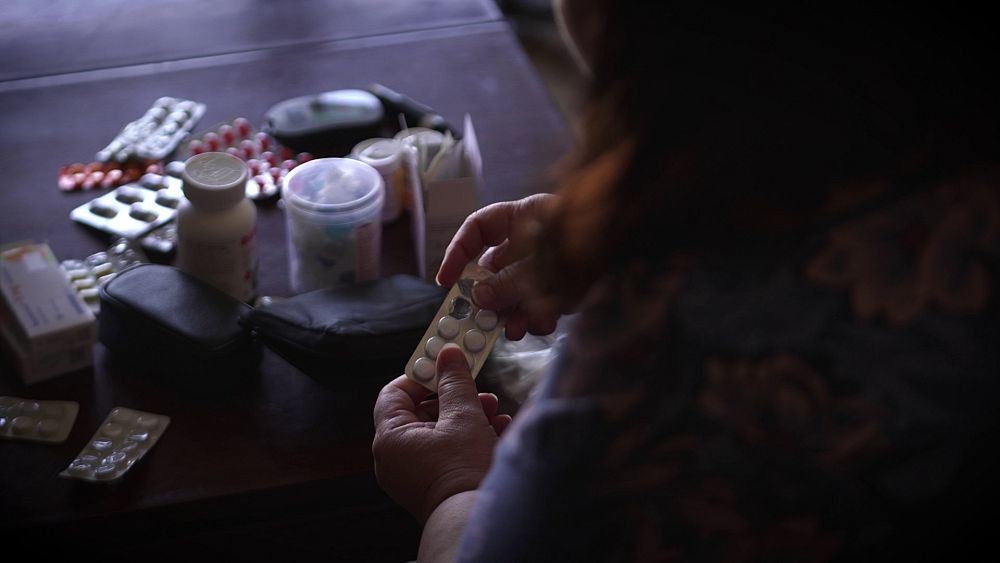Priced out of health: How costly medicines are putting lives at risk

In Bulgaria, 19% of respondents in a recent poll revealed they can’t afford all the medicines they need. In this latest episode of Smart Health, we find out how the EU is proposing to drive down costs to help those most in need.
53-year-old Mariana Alexandrova lives in Sofia, Bulgaria’s capital. She suffers from Type-2 diabetes and her heart is very fragile.
“I take three types of medicines for the heart, two types for the diabetes and about four more types of medicines for the other diseases,” she told Euronews.
Her medicine bills can amount to up to the equivalent of €100 per month, in a country where the average monthly wage is less than €1000.
Mariana says that, although it’s a heavy financial burden, she can afford all the treatments. But as President of a patient’s association, she claims that not everybody is as fortunate.
“Patients who are retired, or are only on benefits, or have a very low salary, often choose to treat only one or two diseases out of the three of four they suffer,” she explained. “They often take the cheapest one for diabetes, and one or two drugs for hypertension. But all the other medicines for diabetic foot, eye, kidney, stomach or neurological diseases… they just skip them.”
The problem is widespread in Bulgaria, where 19% of respondents in a recent poll said they can’t afford all the medicines they need.
Patients suffering from diabetes and/or cardiovascular diseases seem particularly affected.
The head of the cardiology clinic at the National Cardiology Hospital, Borislav Georgiev, says the cost of medicines is potentially putting lives at risk.
“The problem is that if the right therapy is not implemented, the patient will not get good recovery results. We will have a recurrence of coronary problems, we will have complications, repeated heart attacks, the development of atherosclerosis in other body parts, for instance, the legs, with peripheral arterial disease, strokes and so on,” Borislav explained.
Specific levels of reimbursement from the National Health Insurance partially explain the situation, and only the Bulgarian government can act on that. But potential measures at the European Union level could also help improve things in Bulgaria and across all member states.
Seeking alternatives: Generic medicines
In search of more affordable medicines, the European Commission has proposed to increase competition and to make generic and bio-similar medicines more readily available.
Advisor to the Bulgarian Ministry of Health, Arkadi Sharkov, told Euronews he thinks that’s a lead worth exploring.
“Generic preemption and substitution are policies that work well in countries with quality and well-developed antitrust laws,” he revealed.
“Therefore, in Bulgaria, in order to move towards this type of action, it is also necessary to review the so-called vertical integration, namely the interconnection between the manufacturer, wholesaler and pharmacy, so as to avoid a monopoly advantage when it comes to the dispensing of medicines by the pharmacist.”
But the use of generics in Bulgaria is already more widespread than in other bigger and richer member states.
As such, the European Commission is also proposing to use more off-patent medicines repurposed for new therapies. The hope is that greater availability of alternative therapies would contribute to lower prices.
More transparency on public funding to develop medicines could also help make them more affordable, the European Commission maintains.
Whatever they are, solutions are needed, as time is running out for certain patients.
“One of my fellow diabetics is 53 years old. She can currently afford only a fraction of the medicines for hypertension, and the cheapest ones for diabetes,” explained Mariana Alexandrova.
“Everything else, she also has four or five chronic complications and just misses them; she simply can’t afford the medicines she needs. She just hopes the situation won’t get any worse.”
Source: Euro News














